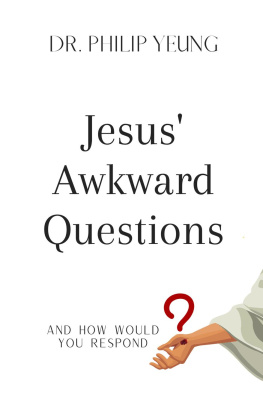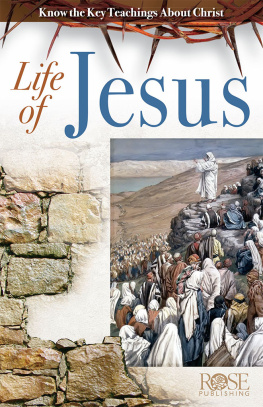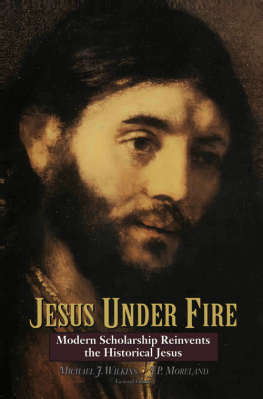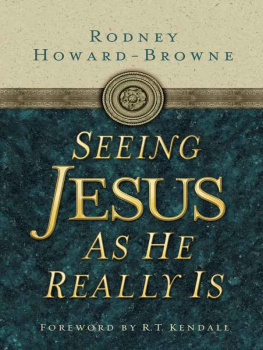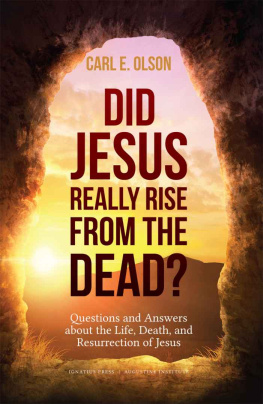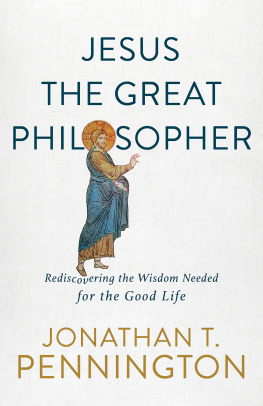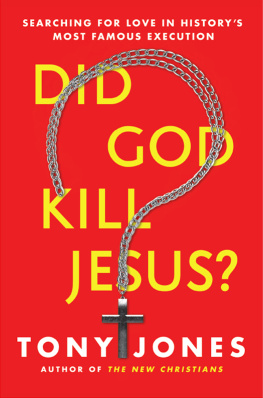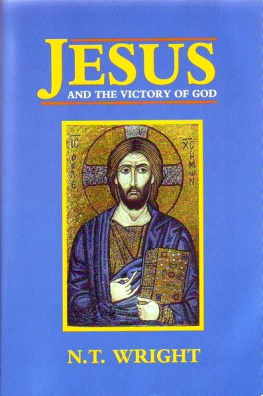To our Creator
Jesus Awkward Questions
Dr. Philip Yeung
2021 by Joanie Yeung
All rights reserved. No part of this publication may be reproduced, stored in a retrieval system, or transmitted in any form or by any means such as electronic, photocopy, recording etc., without the prior written permission of the copyright holder. The only exception is brief quotation in printed reviews.
Unless otherwise stated, all Scripture quotations are taken from the Holy Bible, New International Version, NIV. Copyright 1973, 1978, 1984, 2011 by Biblica, Inc. Used by permission. All rights reserved worldwide.
ISBN: 9798201353797 (eBook)
Cover design by Joanie Yeung
W hat happens when you ask a professional Bible scholar to preach a sermon? Sometimes it can be a disaster. It is one thing to stand before a class to explain some difficult concept in Hebrew or Greek; it is quite another to stand before a congregation to expound a biblical text with simplicity and clarity. In the life of Philip Yeung we have someone who was able to do both with professional competence and pastoral warmth.
I first knew Philip as a student in one of my Hebrew classes in 1978-79 at Regent College in Vancouver. Philip was the best student in the class, always exact in his recall of difficult forms and clear in his answer to challenging questions. I wondered what the future was going to be for this brilliant student, already a trained and accredited medical doctor. Surely it would be a flourishing academic career in some prestigious institution. Indeed, Philip did become an excellent scholar in a highly regarded theological college, but throughout his life Philip never lost his passion for helping people of all backgrounds, students and laity alike, to understand the scriptures in all their profundity as well as in their practical application to life.
This collection of sermons by Philip preached at Emmanuel Chinese Church in Hong Kong puts the reader/listener in the hands of a first rate scholar and at the same time a practically minded preacher. We can trust his clarification of Greek words even as our minds are illuminated and our hearts are warmed by his intimate knowledge of the complexities of modern life, whether in Hong Kong or elsewhere. Bringing both together is never an easy task. Philip, by the grace of God, was gifted to do both.
Sven Soderlund
Professor Emeritus of Biblical Studies
Regent College, Vancouver
E ver since I was very young, I have known that my father, the late Pastor and Doctor Philip Yeung, absolutely loved the Bible. For him, the Bible was a vast treasure trove which he spent much of his life digging into to uncover new treasures each time. Contrary to many peoples expectations, he never told me and my sister to read the Bible. But simply by watching the way he studied it, we learned as children that the Bible is a very precious and exciting book.
My father had a habit of annotating his bibles. The empty spaces on countless pages were filled with very tiny scribbled notes in English, Chinese, Greek, and Hebrew that are hardly legible or comprehensible to other people. He also used a unique system of symbols that he created for himself to represent certain words, and claimed that only he could decipher them.
His decision to give up his medical profession to teach in a Bible seminary shocked many people at the time in the materialistic society of Hong Kong. But every time he shared the story, he was filled with joy and conviction, seeing it as the best decision he could have ever made in his whole life, like the man who sold everything in exchange for a pearl (Matthew 13:4546).
My father joined the China Graduate School of Theology (CGST) in Hong Kong in 1980, and worked there for 40 years in various roles until he was taken home to be with the Lord. The School is renowned for its pastoral, biblical and intellectual training of a whole generation of pastors and Christian workers in both Hong Kong and abroad, and my father devoted his life to this mission. To his friends and students, he was best known as Yeung E, E being the homonym for the word doctor in Chinese. Proficient in Biblical Greek and Hebrew, he was able to teach both languages at graduate level. His teaching focused on applying the Bible to everyday life, opening new perspectives on creation, suffering, the Christian identity, Sabbath rest, vocational calling, and Christianity in the marketplace. For him, salvation is not just about going to heaven sometime in the future; he firmly believed that Gods will for us is as clear and as down-to-earth as it can be here and now.
My fathers passion for studying the original Hebrew texts of Genesis Chapters 13 led to his development of what he called the Creation Theologya system of theology for seeing Gods sovereign will in the physical, functional, and moral orders within the created world, and for understanding how the Creator relates to us in our lives. This Creation Theology opens doors to Biblical teachings that tend to be neglected in much contemporary preaching, especially regarding wisdom literature in the Bible. He saw that the book of Job is as important as the Gospel of John; Genesis is as relevant as Galatians; and Ecclesiastes is as pertinent as Ephesians. He believed that this aspect of Bible teaching is sadly missing from many churches, and he wanted to demonstrate how Creation Theology can helpfully complement our understanding of what Jesus accomplished on the cross.
In September 2020, my father was called home to be with the Lord after a short but fierce battle with pancreatic cancer. One of the legacies he has left is a collection of his sermons and teachings. My family and I plan to translate many of his talks from Chinese to English, so that non-Chinese-speaking believers and seekers, including some of my dads friends and relatives, will be able to benefit from his sermons too.
Jesus' Awkward Questions is the first such project. It is a collection of twelve sermons he preached at Emmanuel Chinese Church, Hong Kong, over a span of eleven years (with several of the chapters taken from his sermon series, Jesus Asks You). Each chapter of the book focuses on a story in which Jesus asked a seemingly strange question, and reflects on what Jesus was revealing about himself, the human condition, and how Jesus relates to us today. Applying his knowledge of biblical Greek, my father dissected the texts by looking at the Gospel authors original word choices and expressions in the historical and cultural contexts of the Ancient Near East.
Translating sermons from the spoken form into written form is not a straightforward process. This book aims to retain all the core messages of the sermons, but certain details that are specific to the internal or local contexts of Emmanuel Chinese Church in Hong Kong have been edited.
Next page
